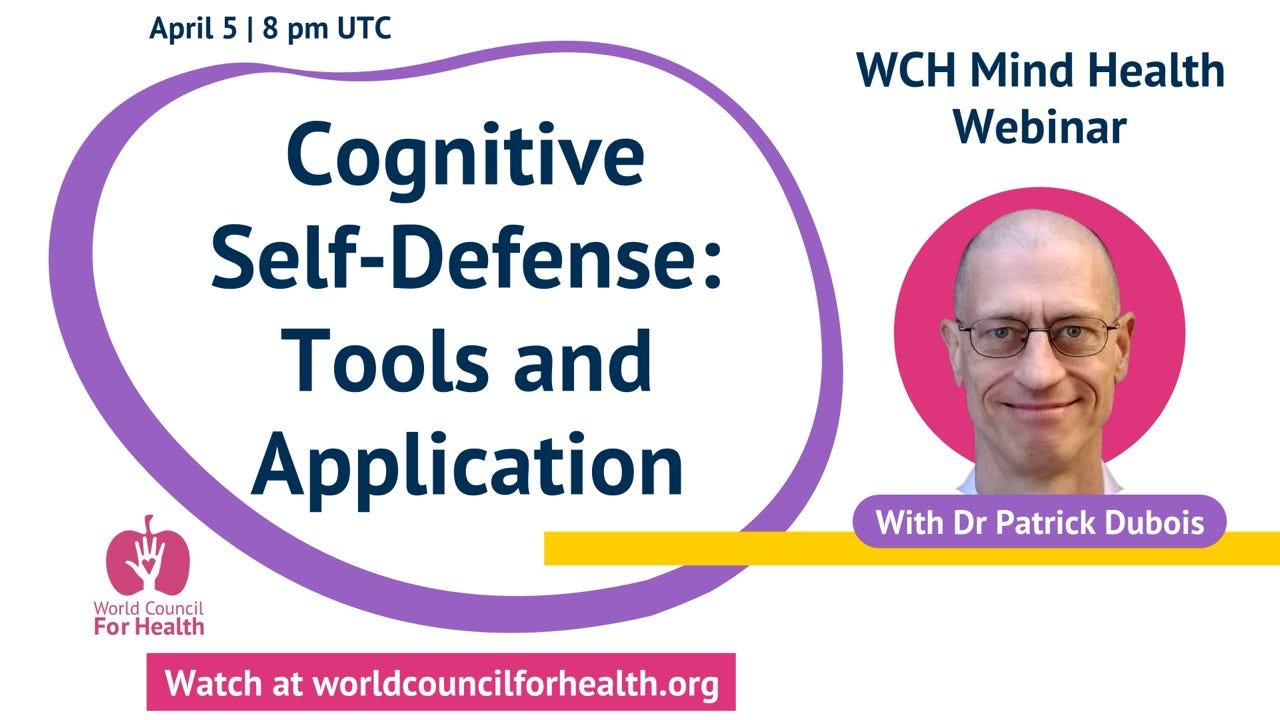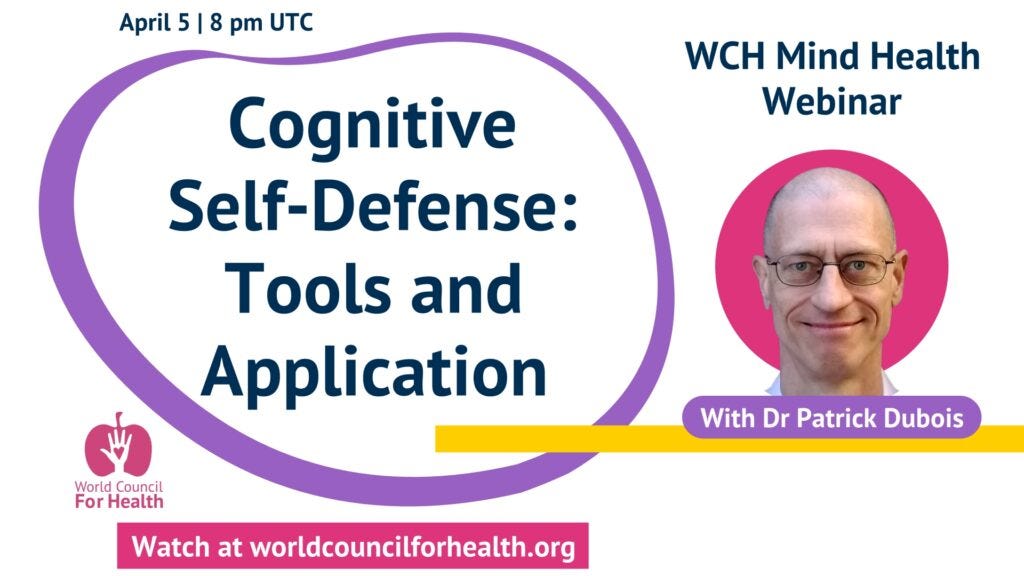Have we been using the wrong tactics?
Why the key to winning an information war is to throw one’s weapons down
A few days ago, someone shared with me how much they loved this recent session from the World Council for Health’s Mind Health Committee. In it, Dr Patrick Dubois gives a presentation on Cognitive Self-Defense, followed by a lively discussion with our Mind Health Committee (MHC) members.
I love these MHC events – they are like a gentle oasis amidst all the noise out there – but I must confess, I had not seen this particular session. When my friend shared they had already seen it not once but three times, I knew I had to investigate!
Having seen it, I understand my friend’s enthusiasm. In his lively presentation, Dr Dubois’ really gets to the heart of a question so many of us have been asking for well over three years now:
Why is it that people can’t see what’s really going on?
Even when the facts are right in front of them, when the truth is laid bare, why do they dismiss it out of hand? And worse still, why, instead of rejecting the abuse that has been inflicted on humanity, do some people ask for more? More controls, more lockdowns, more testing, more mandates?
If you really want to dive deep into this pressing topic, I warmly encourage you to watch Dr Dubois’ presentation (there is no charge to do so, though donations are welcome!). And in fact, he presents a follow-up session live tonight, so do join if you can!
He emphasises that we have been engaged in a war where the battlefield is our hearts and minds. Dr Dubois explains that we are virtual animals, in that we use technology to engage with and understand each other and our world. By technology, he means language, tools, and symbols such as money, as well as the internet, computers, smartphones and so on. In this sense, we already live in a kind of virtual reality – and while this gives us tremendous capacity, it also makes us very vulnerable.
The enemy knows precisely how to press our cognitive buttons – and does this exceptionally well. So well in fact, that they’ve worked out how to override our innate defence mechanisms and use them against us.
The result, as we know, has been devastating abuse, as Margaret Anna Alice captures so lyrically in her poem, Mistakes Were NOT Made.
In the face of such sophistication, what can we do?
I know so many of us have attempted to reason with loved ones enslaved within this abusive relationship with authority. We have presented clear, evidenced information, talked softly, gently, or sometimes firmly and directly. The letter I shared here by an anonymous reader to her politician brother comes to mind – a letter so brilliant, so well argued, meticulously referenced, and yet still fell on deaf ears.
If a letter like that can’t get through, what can?
Dr Dubois offers several solutions, but there’s one in particular I’d like to highlight here. It’s to do with stepping out of fear and back into love, and it’s breathtakingly simple.
In essence, we put our arguments down, our piles and piles of citations and videos and blogs and podcasts. We set them aside, and we invite our loved one to go fishing with us, or cook a meal with us, or join us in the garden to get our hands in the soil. Or, we hold their hand, or, if they permit it, we quite simply, give them a warm and loving hug.
In other words, we experience something together.
When we do or experience something together, we revive a sense of connection and that in turn, calms the nervous system. In that shared experience, the limbic brain that has been lit up by fear – of pathogens perhaps on our loved one’s side, or digital IDs perhaps on our own side – settles down and the frontal cortex, the part of our brain responsible for reasoning, comes back into play.
Duly calm and connected, we are finally able to step out of fear and back into love, peace – and yes, we naturally become more open to entertaining another point of view.
Isn’t this wonderful? It is a beacon of hope.
Perhaps we have written people off as being completely closed to our point of view, when in fact, we simply need to let go of our arguments and spend quality time together, doing something, connecting. There are no guarantees, of course. Perhaps nothing may come of it. But then, all that means is that we will have shared each other’s company, playing or singing or dancing or hugging. How beautiful is that?
Rather than attempt to play those in power at their own game, meeting their ideas and words with our own, let’s throw our information weapons down, climb over the parapet and play together. In the session, Mind Health Committee member Dr Anne O’Reilly references the famous story of WW1 soldiers playing football on Christmas Day. Many consider this to be an apocryphal story – a myth that never happened. But it did happen – and by many accounts, it began with singing.
Join Dr Patrick Dubois for tonight’s LIVE webinar!
As I mentioned, Dr Patrick Dubois is delivering Part 2 of his fascinating presentation on Cognitive Self-Defense tonight and all are welcome. To register (it’s free), you can click on the image below:
Please help support our work!
If you enjoy this Substack and have the means, please consider making a donation - all proceeds go to World Council for Health. You can either:
Can’t donate but would like to contribute? We are always looking for volunteers, so please do get in touch!





No doubt putting down one's weapons is the saintly thing to do. But right now Tess, I feel my friends and family, especially the doctors can go to hell. Forgive them when they tell me "that's interesting" when I send them something shocking, then gayly jet off to some tropical paradise or recount a party they threw when people like James Roguski are working so hard for all our freedom, and injured people are suffering so terribly? When poor moms are being bribed to get their babies jabbed, still. Sorry, but they know precisely what is happening. It's just too inconvenient to do something about it. Just like at school in South Africa during apartheid when I was told that " ladies don't discuss politics". Or like when they laughed my father out of the doctors' tearoom for saying he would not be using Thalidomide on his patients, then never apologised. Or like when hardly any of our doctor friends spoke up when Steve Biko was murdered. Yeah, well maybe on another day I will do some gardening with people like that. Right now I will spend my precious days with people of courage who care.
I do love this, Tess, and am working on it. Part of the difficulty for me to “throw my weapons down” - particularly with close friends - is that their beliefs are a direct threat to my freedoms. Their beliefs have enabled the loss of my job and the denial of my entering certain establishments (unless I could prove I’m not infectious). They still believe, even at this late date, that these things were justified. So while I love these people dearly, and still interact with them, I find my heart is heavy and sometimes my defenses rise quite easily. It’s not what I want; I do want to simply love. It’s just not always that easy.
I’m looking forward to listening to Dr. Dubois’ presentation. Another good resource for understanding why these conversations have been so difficult is reachingpeople.net.
Editing to add that this verse resides on my desk as a reminder: 1 Cor 16:14 “Let love and kindness be the motivation behind all that you do.” (The Passion Translation)